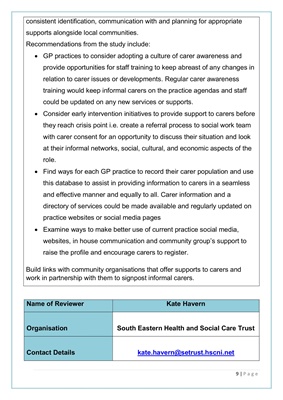
9 | P a g e
consistent identification, communication with and planning for appropriate
supports alongside local communities.
Recommendations from the study include:
• GP practices to consider adopting a culture of carer awareness and
provide opportunities for staff training to keep abreast of any changes in
relation to carer issues or developments. Regular carer awareness
training would keep informal carers on the practice agendas and staff
could be updated on any new services or supports.
• Consider early intervention initiatives to provide support to carers before
they reach crisis point i.e. create a referral process to social work team
with carer consent for an opportunity to discuss their situation and look
at their informal networks, social, cultural, and economic aspects of the
role.
• Find ways for each GP practice to record their carer population and use
this database to assist in providing information to carers in a seamless
and effective manner and equally to all. Carer information and a
directory of services could be made available and regularly updated on
practice websites or social media pages
• Examine ways to make better use of current practice social media,
websites, in house communication and community group's support to
raise the profile and encourage carers to register.
Build links with community organisations that offer supports to carers and
work in partnership with them to signpost informal carers.
Name of Reviewer Kate Havern
Organisation
South Eastern Health and Social Care Trust
Contact Details
kate.havern@setrust.hscni.net